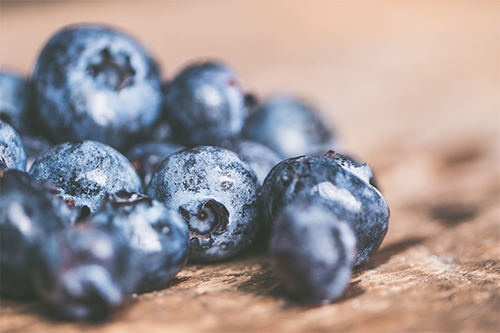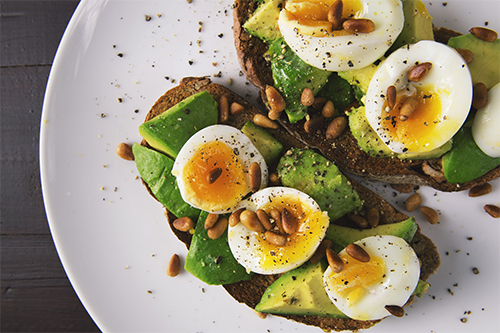February is American Heart Month, which is an opportune time to show your heart some much-deserved TLC by picking up some healthy new habits.
First, though, here’s a primer on why the heart gets a month all to itself: Thirty-three percent of U.S. adults are estimated to have hypertension, commonly known as high blood pressure. Left untreated, hypertension can lead to more serious problems including heart disease and stroke. Also, cardiovascular disease is the most common cause of death around the world, with more than 17.3 million deaths each year, according to the American Heart Association. That figure is expected to increase to 23.6 million by 2030.
The good news, though? Lifestyle choices can help keep your ticker healthy. (You probably already know that avoiding cigarettes, exercising daily, and eating a diet rich in fruits, vegetables, and whole grains are some of the best defenses you can put up to protect yourself from heart disease.)
To honor the month, we’ve turned to health experts and research to discover 28 strategies (one for each day in February) to improve your heart health. These science-backed, small — yet specific — changes and goals can help strengthen your heart year-round.
1. Get more ZZZs
Poor sleep can increase the risk of heart disease and contribute to many of the conditions that set the stage for it, like obesity, high blood pressure, and diabetes, explains Phyllis Zee, M.D., Ph.D., a neurology professor at Northwestern University. This is especially important for women, says Zee, a co-author of the Women & Sleep Guide and a member of the Society for Women’s Health Research Interdisciplinary Network on Sleep. “Women face unique barriers to good sleep and the signs and symptoms of sleep disorders in women can be overlooked by healthcare professionals,” she says. In particular, Zee says, sleep apnea is strongly linked to heart disease and is very easy to miss in women who often don’t experience the hallmark loud snoring that men with apnea do.
2. Schedule a “walking meeting”

Instead of meeting over coffee or in a conference room, suggest a walking meeting. Or, block out 20 to 30 minutes a day to go for a walk. Researchers at Binghamton University found that walking at a brisk pace 150 minutes a week can improve cardiovascular risk factors.
3. Floss daily
Did you know that your oral health can be an indicator of your heart health? Theresa L. Shannon, D.D.S., a private practice dentist in Falls Church, Virginia, and the public information officer for the Virginia Academy of General Dentistry, recommends flossing daily, brushing your teeth twice a day with antibacterial toothpaste, and visiting your dentist at least twice a year. These steps can help reduce the inflammatory proteins and bacteria associated with gum disease, which can enter the bloodstream and thicken the blood vessel walls, she says. Research explaining the correlation has been published in “Circulation.”
4. Challenge yourself to make more meals at home

And, to really get this right, use whole foods when you’re cooking. The American Heart Association recommends no more than 2,300 mg of sodium a day, and ideally no more than 1,500 mg of sodium a day for most adults. The average American’s sodium intake tends to be excessive, the association warns, but don’t go wagging your finger at the salt shaker. “The great majority of sodium intake in the average American diet is from processed foods and eating out,” says Joel Robbins, M.D., a cardiologist with the Palatine Heart Center in Crystal Lake, Illinois. In fact, more than 75 percent of the sodium Americans eat comes from processed, pre-packaged, and restaurant foods, according to the American Heart Association.
5. Experiment with spices
Cutting back on sodium gives you the opportunity to get creative with spices, says Becky Kerkenbush, a clinical dietitian with Watertown Regional Medical Center in Wisconsin and a member of the Wisconsin Academy of Nutrition & Dietetics. Some salt-free seasonings that Kerkenbush recommends: allspice, basil, bay leaves, chives, cider vinegar, cinnamon, curry, dill, garlic, ginger, lemon or lime juice, dry mustard, nutmeg, onion powder, paprika, parsley, rosemary, sage, thyme, and turmeric.
6. Look for foods fortified with sterols and stanols
Both sterols and stanols are found naturally in plant-based foods and can help lower bad cholesterol. Companies are also adding them to items like orange juice, granola bars, and chocolate, and making them available in supplement form, according to Harvard Medical School. Getting 2 grams of plant sterols or stanols a day can lower LDL cholesterol by nearly 10 percent.
7. Nosh on nuts and berries the next time you have a snack attack

Pause before you grab some greasy potato chips or sugar-loaded cookies. Instead, opt for a healthy snack that will still satiate your cravings. Berries and nuts are snacks Lindsey Bristol, a Chicago-based R.D. with Swanson Health, recommends. Berries feature antioxidants, fiber, and flavonoids that support wellness, she explains. “One serving of blueberries alone each week can help maintain heart health,” she says. Tree nuts like almonds, cashews, and pistachios are loaded with magnesium, which makes them a good fit for heart-healthy diets, Bristol explains. Stay away from roasted or salted versions, though, she warns.
8. Try the 4-7-8 breathing technique
High stress, of course, can translate to high blood pressure. But science makes a case for taking a timeout to do controlled breathing exercises. Stanford and University of California-San Francisco researchers identified a handful of nerve cells that exist in the brainstem and connect breathing to states of mind, helping explain why deep, slow breaths are associated with a calming sensation. Karen Bernstein Shoshana, who is certified in Functional Diagnostic Nutrition in Wilmette and lead health expert at Wellness Girl, recommends the 4-7-8 technique. (She credits it to Andrew Weil, director of Arizona Center for Integrative Medicine). “The idea is to breathe in to a count of 4, hold for a count of 7, and breathe out to a count of 8,” she explains. Do this for four cycles in the morning and four cycles at night.
9. Ditch the drive-thru
It’s no surprise that fast food, which tends to be fried and fatty, is a foe of your heart. But research published in “Circulation” found that people who consume fast food even twice a week increase their risk of dying from coronary heart disease by a whopping 20 percent in comparison to those who avoid fast food. The study was carried out in Singapore. For those who eat fast food two to three times a week, the risk increases to 50 percent. Then, it goes up to nearly 80 percent for those who are hitting up the drive-thru four or more times per week.
10. Give lavender aromatherapy a try
French lavender is known to promote relaxation, points out Rebecca Lee, a registered nurse from New York City and the founder of the natural health resource Remedies For Me. The notion is even backed up by research that shows certain essential oils can help lower blood pressure. The 2006 Korean study cited blends of lavender, ylang lang, and bergamot as the effective oils.
11. Listen to some Beethoven
Music can subconsciously benefit our mood, Lee says, and picking the right type of tunes can help lower blood pressure. A 2004 study found that music can help improve cardiovascular recovery from stress. Listening to classical music brought about better results than listening to jazz or pop.
12. Sip on some hibiscus tea
Sure, National Hot Tea Month was in January, but keep celebrating, especially with a cup of hibiscus tea. The tea proved to lower blood pressure in a group of pre-hypertensive and mildly hypertensive adults, according to research presented at an American Heart Association conference. Don’t stop there, though — there are more health benefits associated with many different types of tea.
13. Try that trendy avocado toast

“My simple tip for improving heart health is to eat more healthy fats,” says Courtney Ferreira, R.D., owner of nutrition consulting business Real Food Court. Cutting out fat can improve some aspects of blood cholesterol, but it typically will also lower HDL, aka our good cholesterol, she explains. Keep HDL high and your heart healthy by focusing on healthy fats found in nuts, seeds, olive oil, and avocado. Ferreira says one-fourth of an avocado is a good serving size at a meal or as a snack. “They are particularly tasty with eggs, on toast or in chili,” she says. For plenty of delicious ways to incorporate avocado into your meals, check out these 10 easy avocado recipes you’ll make again and again.
14. Serve salmon for dinner, but make sure it’s wild salmon
Wild salmon has about 30 percent less calories than farmed salmon, explains Bess Berger, a New Jersey-based R.D.N with ABC Nutrition. “Also, the ratio of omega-3 to omega-6 in wild salmon is far superior to farmed salmon,” she says. “The ratio in wild salmon correlates with decreased rates of heart disease and cancer.”
15. Wear a pedometer
Activity trackers are having a major moment. You don’t have to splurge on a pricy, high-tech one, though. A simple pedometer will do the trick, says Berger. Challenge yourself to reach 10,000 steps a day to better your heart health. “If you currently walk about 2,500 steps, don’t shoot for 10,000 right way,” she says. “Instead, increase the steps in increments.”
16. Cook with garlic
Garlic may reduce blood pressure and atherosclerosis, which is the hardening of the arteries, Kerkenbush says. For a sweeter taste, try black garlic, which actually packs double the antioxidants, she explains. Also, her pro tip to making your garlic last: Store it in a cool, dry place and away from sunlight, but not in the refrigerator.
17. Spike your meals with chia seeds
Add chia or flaxseeds to smoothies, soups, cereal, salads, or yogurt, suggests Kerkenbush. They contain healthy, polyunsaturated fat that can reduce inflammation and cut down your risk for heart disease. Other foods that are rich in this good fat include walnuts and fatty fishes, like salmon, lake trout, and albacore tuna, Kerkenbush says.
18. Drink green tea
Like its cousin hibiscus tea, green tea also boasts heart-healthy benefits. It may help decrease cholesterol levels in blood, Kerkenbush says, and it could help prevent heart attacks and strokes. Don’t drink it with milk, though, because the casein that’s present in milk inhibits the tea’s benefits, she explains.
19. Take your workout outdoors
Research from Johns Hopkins Medicine last year found a “synergistic” link between exercise and good levels of the “sunshine” vitamin D levels in reducing the risk of heart attacks and strokes. The researchers found that the two factors working together did more than either factor alone when it comes to protecting the cardiovascular system. So, lace up those running shoes and go for a jog outside. Need some extra motivation? Sign up for a charity 5K. Here’s how to start your training.
20. Add yoga to your workout routine

We all tend to have a favorite exercise or workout regimen. But, it could help your heart to mix it up. Heart disease patients who practiced yoga in addition to aerobic exercise saw twice the reduction in blood pressure, body mass index, and cholesterol levels compared to those who practiced yoga or exercise alone, according to 2017 research from the American College of Cardiology. Ready to get your om on? Here are seven yoga poses to start your day off right.
21. LOL
Laughter, along with telling jokes, could help protect you against a heart attack, according to study by cardiologists at the University of Maryland Medical Center in Baltimore. That’s your hint to plan a night out at The Second City.
22. Eat 8 servings of fruits and veggies a day
Forget what you’ve heard about eating five fruits and veggies a day. New research published in the “International Journal of Epidemiology” says you should be getting eight servings. The study found that the risk of cardiovascular disease was reduced by a quarter in people who ate 800 grams of fruit and veggies a day compared to those who ate very little or no fruits and vegetables.
23. And these fruits and veggies are particular powerhouses

Apples, grapes, strawberries, and citrus fruits are all rich in pectin, a type of soluble fiber that can lower LDL levels, according to Harvard Medical School. As for veggies, eggplant and okra are both low in calories and stellar sources of soluble fiber.
24. Pop some peppers into your meal plan
Jalapeños, habañeros, and other spicy chili peppers contain capsaicin, which researchers say can lower bad cholesterol levels without tampering with your good cholesterol.
25. Bake or broil your fish
When you bake or broil fish, you get more of the heart-healthy omega-3 fatty acids than if you were to fry, salt, or dry the fish, according to American Heart Association research. Also, adding low-sodium soy sauce or tofu can enhance the heart health benefits.
26. Give up the diet soda
Even though it’s zero calories, that doesn’t mean it’s good for you. Artificial sweeteners such as aspartame and sucralose may be associated with a dizzying array of health problems, including increased risk of high blood pressure and heart disease, according to a study published in 2017 in the Canadian Medical Association Journal.
27. Add barley to your soup or salad
Barley is high in fiber and protein. But its superpower is its ability to lower not one, but two types of bad cholesterol, according to a St. Michael’s research paper.
28. Eat chocolate
We saved the best for last: Eating chocolate every day is linked to lower heart disease and stroke risk, according to 2015 research published in “Heart.” More good news: This study didn’t make the distinction between dark and milk chocolate, possibly suggesting both could have health benefits (although a square or two of dark chocolate is no doubt your healthiest bet).

Brittany Anas is a freelance writer who specializes in health, fitness and travel writing. She also contributes to Men’s Journal, Women’s Health, Trip Savvy, Simplemost, Orbitz, and Eat This, Not That! She spent a decade working at daily newspapers, including The Denver Post and the Daily Camera in Boulder, Colorado, and she is a former federal background investigator. In her free time, Brittany enjoys hiking with her gremlin-pot belly pig mix that the rescue described as a “Boston Terrier” and coaching youth basketball. She also works with domestic abuse survivors, helping them regain financial stability through career coaching. Follower her on Twitter and Instagram.

